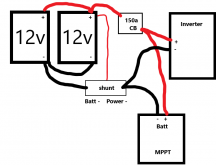martyfarkle
New Member
- Joined
- Oct 5, 2020
- Messages
- 27
I recently bought and hooked up a Victron SmartShunt. It works like a dream on BlueTooth, and I thought this would be an accurate view of my battery state/usage.
For storage I have two Valence, 40ah RT Series 12v batteries hooked up in parallel. There is a substantial discrepancy in the voltage between my Klein voltmeter (MM300) and the Victron SmartShunt (500a) as follows:
I have measured for voltage drops across my various connections and there are none. I have calibrated the SmartShunt to 0.0 amps under zero load conditions. But these should not be implicated in any of the voltage discrepancies. I see it as a battle between the Voltmeter and the SmartShunt.
The only remote caveat might be the Epever MPPT connection. The MPPT battery minus is connected to the 'system minus' side of the shunt, and the battery plus goes to the 150a circuit breaker, which goes to the battery. The circuit breaker is closed. Yet, I do not see that as influencing the differing voltage between the two devices.
Has anybody else come across this issue? Does anyone have some wisdom on this matter?
For storage I have two Valence, 40ah RT Series 12v batteries hooked up in parallel. There is a substantial discrepancy in the voltage between my Klein voltmeter (MM300) and the Victron SmartShunt (500a) as follows:
| Load (amps) | SmartShunt | Voltmeter | Difference |
| 0 amps | 13.15 volts | 13.24 volts | .09 volts |
| 4 amps | 13.09 volts | 13.19 volts | .10 volts |
I have measured for voltage drops across my various connections and there are none. I have calibrated the SmartShunt to 0.0 amps under zero load conditions. But these should not be implicated in any of the voltage discrepancies. I see it as a battle between the Voltmeter and the SmartShunt.
The only remote caveat might be the Epever MPPT connection. The MPPT battery minus is connected to the 'system minus' side of the shunt, and the battery plus goes to the 150a circuit breaker, which goes to the battery. The circuit breaker is closed. Yet, I do not see that as influencing the differing voltage between the two devices.
Has anybody else come across this issue? Does anyone have some wisdom on this matter?




